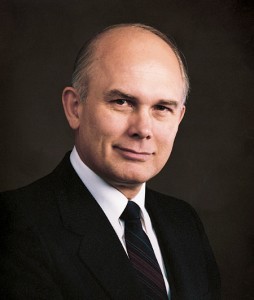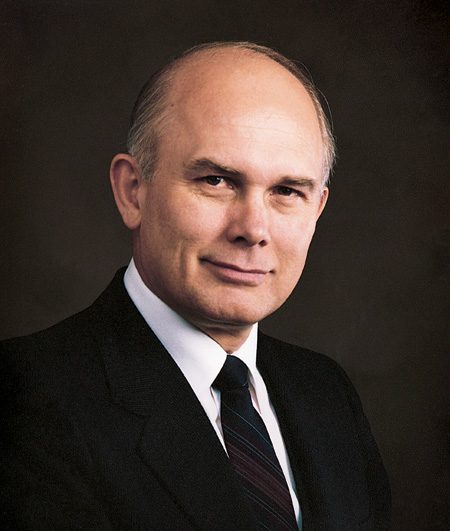By Elder Dallin H. Oaks
THE familiar observation that “timing is everything” surely overstates the point, but timing is vital. In all the important decisions in our lives, what is most important is todo the right thing. Second, and only slightly behind the first, is to do the right thing at the right time. People who do the right thing at the wrong time can be frustrated and ineffective. They can even be confused about whether they made the right choice when what was wrong was not their choice but their timing.
My first point on the subject of timing is that the Lord has His own timetable. “My words are sure and shall not fail,” the Lord taught the early elders of this dispensation. “But,” He continued, “all things must come to pass in their time” (D&C 64:31–32).
The first principle of the gospel is faith in the Lord Jesus Christ. Faith means trust—trust in God’s will, trust in His way of doing things, and trust in His timetable. We should not try to impose our timetable on His. Indeed, we cannot have true faith in the Lord without also having complete trust in the Lord’s will and in the Lord’s timing.
In our service in the Lord’s Church we should remember that when is just as important as who, what, where, and how.
Continuing revelation is the means by which the Lord administers His timing. We need that revelatory direction. For example, many of us or our descendants will doubtless participate in the fulfillment of prophecies about the building of the city of New Jerusalem (see D&C 84:2–4). But in this matter the timing is the Lord’s, not ours. We will not be approved or blessed in clearing the ground or pouring the footings for that great project until the Lord has said that it is time. In this, as in so many other things, the Lord will proceed in His own time and in His own way.
People who do not accept continuing revelation sometimes get into trouble by doing things too soon or too late or too long. The practice of polygamy is an example.
In my conference talk last October I gave another illustration—the importance of following the Lord’s timing with those we try to interest in hearing the gospel message. Proclaiming the gospel is His work, not ours, and therefore it must be done on His timing, not ours. There are nations in the world today that must hear the gospel before the Lord will come again. We know this, but we cannot force it. We must wait upon the Lord’s timing. He will tell us, and He will open the doors or bring down the walls when the time is right. We should pray for the Lord’s help and directions so that we can be instruments in His hands to proclaim the gospel to nations and persons who are now ready—persons He would have us help today. He knows when groups or individuals are ready, and He wants us to hear and heed His timetable for sharing His gospel with them.
The Lord’s timing also applies to the important events of our personal lives. A great scripture in the Doctrine and Covenants declares that a particular spiritual experience will come to us “in his own time, and in his own way, and according to his own will” (D&C 88:68). This principle applies to revelation and to all of the most important events in our lives: birth, marriage, death, and even our moves from place to place.
Someone has said that life is what happens to us while we are making other plans. Because of things over which we have no control, we cannot plan and bring to pass everything we desire in our lives. Many important things will occur in our lives that we have not planned, and not all of them will be welcome. The tragic events of September 11th and their revolutionary consequences provide an obvious example. Even our most righteous desires may elude us, or come in different ways or at different times than we have sought to plan.
For example, we cannot be sure that we will marry as soon as we desire. A marriage that is timely in our view may be our blessing or it may not. My wife Kristen is an example. She did not marry until many years after her mission and her graduation.
The timing of marriage is perhaps the best example of an extremely important event in our lives that is almost impossible to plan. Like other important mortal events that depend on the agency of others or the will and timing of the Lord, marriage cannot be anticipated or planned with certainty. We can and should work for and pray for our righteous desires, but, despite this, many will remain single well beyond their desired time for marriage.
So what should be done in the meantime? Faith in the Lord Jesus Christ prepares us for whatever life brings. This kind of faith prepares us to deal with life’s opportunities—to take advantage of those that are received and to persist through the disappointments of those that are lost. We should commit ourselves to the priorities and standards we will follow on matters we do not control and persist faithfully in those commitments whatever happens to us because of the agency of others or the timing of the Lord. When we do this, we will have a constancy in our lives that will give us direction and peace.
Wise are those who make this commitment: I will put the Lord first in my life and I will keep His commandments. The performance of that commitment is within everyone’s control. We can fulfill that commitment without regard to what others decide to do, and that commitment will anchor us no matter what timing the Lord directs for the most important events in our lives.
If we have faith in God and if we are committed to the fundamentals of keeping His commandments and putting Him first in our lives, we do not need to plan every single event—even every important event—and we should not feel rejected or depressed if some things—even some very important things—do not happen at the time we had planned or hoped or prayed.

The first principle of the gospel is faith in the Lord Jesus Christ. We should not try to impose our timetable on His. Indeed, we cannot have true faith in the Lord without also having complete trust in the Lord’s will and in the Lord’s timing.
After I served as president of BYU for nine years, I was released. A few months later the governor of the state of Utah appointed me to a 10-year term on the supreme court of this state. I was then 48 years old. My wife June and I tried to plan the rest of our lives. We wanted to serve the full-time mission neither of us had been privileged to serve. At the end of two 10-year terms, when I would be nearly 69 years old, I would retire from the supreme court and we would submit our missionary papers and serve a mission as a couple.
Four years after we made that plan I was called to the Quorum of the Twelve Apostles—something we never dreamed would happen. Realizing then that the Lord had different plans and different timing than we had assumed, I resigned as a justice of the supreme court. But this was not the end of the important differences. When I was 66, my wife June died of cancer. Two years later I married Kristen McMain, the eternal companion who now stands at my side.
How fundamentally different my life is than I had sought to plan! My professional life has changed. My personal life has changed. But the commitment I made to the Lord—to put Him first in my life and to be ready for whatever He would have me do—has carried me through these changes of eternal importance.
Faith and trust in the Lord give us the strength to accept and persist, whatever happens in our lives. I did not know why I received a “no” answer to my prayers for the recovery of my wife of many years, but the Lord gave me a witness that this was His will, and He gave me the strength to accept it. Two years after her death, I met this wonderful woman who is now my wife for eternity. And I know that this also was the will of the Lord.
Do not rely on planning every event of your life—even every important event. Stand ready to accept the Lord’s planning and the agency of others in matters that inevitably affect you. Plan, of course, but fix your planning on personal commitments that will carry you through no matter what happens. Anchor your life to eternal principles, and act upon those principles whatever the circumstances and whatever the actions of others. Then you can await the Lord’s timing and be sure of the outcome in eternity.
Elder Dallin H. Oaks is a member of the Quorum of the Twelve Apostles of the Church of Jesus Christ.
The full text of this address can be found online at speeches.byu.edu/devo/2001-02/OaksW02.html.
THE GREATEST SEASON
This is the greatest day—the greatest season—in the history of The Church of Jesus Christ of Latter-day Saints in my judgment. How wonderful to be alive today. How wonderful to be a part of this great cause at this time in the history of the world and in the history of this church. Never has it been so large. Never has it been so strong. Never has it been so highly regarded. Never has it made the kind of progress that it is making today. . . . Things are getting better and better. And I feel profoundly grateful for that.
—President Gordon B. Hinckley, “The Lord Is at the Helm,” Fireside Address, March 6, 1994
The full text of this speech is available at speeches.byu.edu/Detail.tpl?sku=94-109










